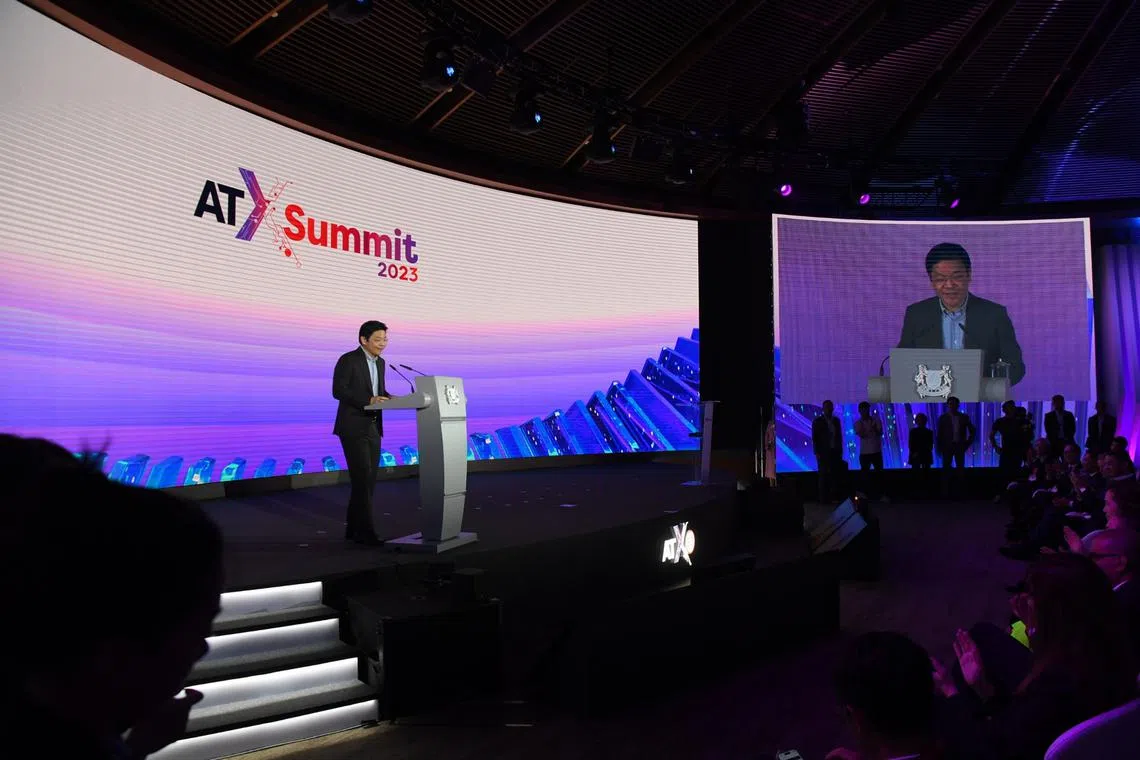Cyber security, connectivity needed to tap potential of digital economy: DPM Wong
Sign up now: Get ST's newsletters delivered to your inbox

DPM Lawrence Wong at the Asia Tech x Singapore 2023 conference, held in Sentosa, on June 6, 2023.
ST PHOTO: AZMI ATHNI
SINGAPORE – Cyber security, connectivity and the responsible use of artificial intelligence (AI) are among key digital priorities that need to be addressed, Deputy Prime Minister Lawrence Wong said on Tuesday.
The digital economy, comprising the information and communications technology (ICT) sector and digitalisation in other industries, grew to account for 17 per cent of Singapore’s gross domestic product in 2022, according to figures by the Infocomm Media Development Authority (IMDA).
The ICT sector alone, comprising software development and online services, grew by 8.6 per cent in 2022, compared with 3.6 per cent for the overall economy, said IMDA.
Mr Wong, who is also Finance Minister, said that across South-east Asia, the digital economy is projected to grow fivefold to $1 trillion by 2030, driven by new Internet users and a rising middle class.
“There are tremendous opportunities ahead of us, particularly in this part of the world,” he said at the Asia Tech x Singapore 2023 conference, which is being held in Sentosa from Tuesday to Friday.
The conference on global technology issues is attended by tech professionals from all over the world.
But there are challenges ahead, such as different rules on how data is handled across nations, concerns about job security and the ethics of AI usage, said Mr Wong.
“How we manage these problems will define the future of the digital economy today,” he said.
Singapore needs to strive for a digital economy that is trusted, interconnected and inclusive, DPM Wong added.
Establishing this will need the building of hard connectivity infrastructure, such as new subsea cable landings to increase Singapore’s network capacity,
Mr Wong said soft infrastructure like apps that support digital transactions, digital identity and certification also form the backbone of today’s digital economy. These tools need to work across borders in order to realise the next bound of digital growth.
To do so, countries need to build trust by continuing to combat fraud and cyber attacks to reduce the risks to users making digital transactions.
Countries should also work towards a common ground for the management of data, which will make it easier for them to collaborate and reduce costs for businesses, said Mr Wong.
He also said a collective international approach is needed to deal with the issues AI raises.
While AI promises to shake up the digital economy with great potential, there remain serious concerns, especially in the biases that AI can exhibit in its decision-making, said Mr Wong.
“As AI becomes more intimate and human-like, what is to stop it from being used to perpetuate falsehoods in society, commit hard-to-detect scams and undertake foreign influence operations?” he said, adding that these are the issues regulators, businesses and society will need to tackle.
Mr Wong said: “No country can deal with all these issues alone. Only by coming together, and drawing on our collective wisdom and experiences, can we hope to succeed.”
Estonian Prime Minister Kaja Kallas, who was one of the speakers at the conference, said that a shared digital space can be achieved only through collaboration and cyber security.
The European nation, which is among the most digitally advanced economies, nearly doubled its annual cyber-security budget in 2022, said Ms Kallas, who urged other countries to consider doing likewise amid a rapidly changing security climate.
She cited Estonia’s collaboration with Ukraine to develop administrative online services since 2012, which has paved the way for Ukraine to continue delivering online services even during war.
Estonia is now learning from Ukraine’s digital experience, piloting a government app based on Ukrainian public service portal Diia, which Ms Kallas said is another example of how collaboration can help countries meet their common goals.
In a recorded keynote address, former New Zealand prime minister Jacinda Ardern said that tech innovations move fast and come with risks, especially in AI, with even the developers of these tools having cautioned against their perils.
While communities around the world search for ways to govern the deployment of AI tools, it is difficult to do so because the technology is not well understood, she said.
“I encourage you to look towards flexible collaborative solutions,” she said, citing how the authorities and companies worked together to block the circulation of a live-streamed terror attack in Christchurch in 2019, and later sparked an effort to weed out extremist content online.
Ms Ardern added that such collaboration is key to enabling the industry to solve issues in an uncertain environment, including the setting up of guard rails and operating principles in AI.
Correction note: A previous version of the story stated that DPM Lawrence Wong said that Singapore’s digital economy has grown more than 10 per cent on average in each of the last five years. He did not say this. We are sorry for the error.


